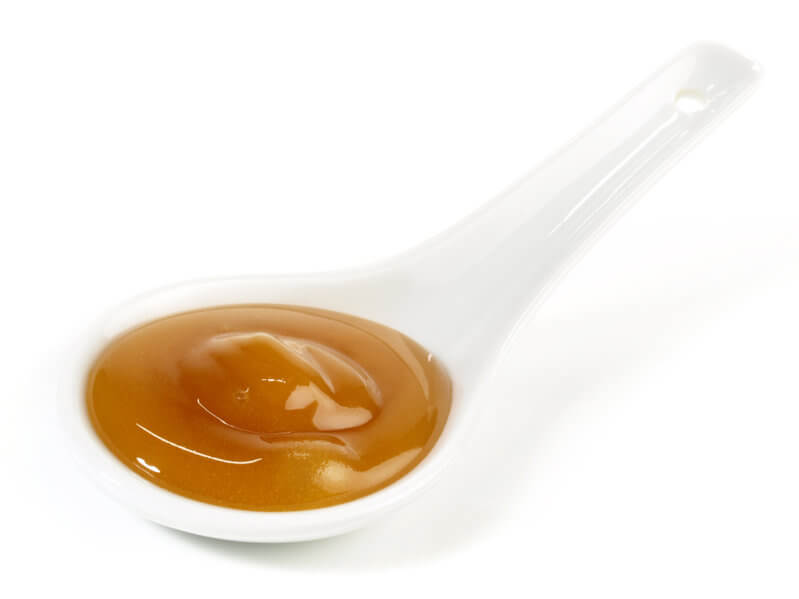Originally seen as a fringe “alternative” medicine, Manuka honey has been rising in mainstream popularity. What once had to be special ordered or found at niche natural food stores can now be found in grocery stores and even “big box” stores like Costco. Today we’re going to discuss 16 uses for Manuka honey, but first—what is it, and why is this particular kind of honey considered medicinal?
What’s So Special About Manuka Honey?

Honey is honey, right? Wrong. While all honey is delicious, and most may even have some medicinal properties, Manuka honey is in a class of its own. This “monofloral” honey is named after the single plant source its nectar comes from, the Manuka tree (or Mānuka, in Maori) which grows primarily in New Zealand.
Manuka Honey Is More Potent
Unlike “regular” types of honey that include nectar and pollen from many different plant types, honey made from the nectar of the Manuka tree contains a compound called methylglyoxal (MGO).
This unique compound is known for having antibacterial properties and is linked to many of the uses we are going to discuss today.
Manuka Honey Is More Acidic
All honey is acidic, but its actual pH varies depending on what plant the nectar is sourced from. Manuka honey is more acidic than most honey varieties, which may also contribute to some of its potential healing properties.
Close to Forty Years of Study
The properties of Manuka honey first began to be studied in the mid-1980s. In 2008, the compounds responsible for its unique healing effects were identified and isolated, paving the way for even more research into the various potential uses for Manuka honey.
Uses For Manuka Honey
So let’s get down to it; what can you use Manuka honey for?
1. FDA Approved for Use in Wound Healing
One of the most common uses for Manuka honey is in wound healing—the FDA has even approved a few different sterilized versions for use in hospital settings. It is especially beneficial due to its antibacterial properties.
In a study of 40 patients with various different kinds of skin wounds, 88% of the cases were completely healed using Manuka honey. Another study found that the unique compounds in Manuka honey can enhance wound healing and assist in tissue regeneration.
Honey is also low in moisture, which means it pulls moisture from a wound (removing waste, dehydrating and killing bacteria, and potentially speeding up the healing process.) This makes Manuka honey a great thing to keep on hand, as even minor injuries could benefit from its wound-healing properties!
2. It Can Help Make Scarring Less Painful
Not only is Manuka honey great for overall wound healing, but it can also have some beneficial effects on scarring.
One study on eyelid surgical wounds showed that participants reported less pain and less stiffness during the healing process when using Manuka honey, as opposed to just using Vaseline.
3. It Can Be Used to Treat Diabetic Ulcers
Many people who struggle with diabetes will develop an ulcer of some kind, usually on their feet or toes. These types of wounds are well known for being incredibly difficult to treat and very slow to heal.
Fortunately, Manuka honey’s unique properties (such as being antibacterial and moisture drawing) actually cause it to be even more effective in treating diabetic ulcers than other types of wounds. Studies are showing that honey can rapidly increase the speed of healing for diabetic ulcers, making Manuka honey a treatment well worth trying.
4. Manuka Honey Is Good for Burns
Most people know that aloe is a great plant-based treatment for burns, but it turns out that Manuka honey may be an even better option!
We’ve already discussed that it is antibacterial and anti-inflammatory, which can help keep a burn from getting infected and reduce the swelling and inflammation. Studies are finding that honey also has equal or better effects on burn healing than conventional treatments, and may even be pain-relieving.
Burn treatment is just one of the many hospital-related uses for Manuka honey, but you can also use Manuka honey at home for minor kitchen burns.
5. It’s Great for Treating Sore Throats
Many of us put honey in our tea when we have a sore throat, so this one should come as no real surprise—however, Manuka honey is vastly superior to conventional honey for this use.
Why? Because its antibacterial properties mean that, in addition to coating the throat and soothing the soreness, it can actually fight the bacteria that may be causing your sore throat to begin with.
This includes the bacteria that causes “strep throat.” Next time you’re fighting a sore throat try switching out your usual honey for Manuka, or try Manuka honey lozenges.
(Note: some of the helpful properties of Manuka honey can die if exposed to too much heat, so make sure you don’t put this honey straight into boiling-hot tea.)
6. It Can Help With IBS

One of the more surprising uses for Manuka honey is its potential for treating Irritable Bowel Syndrome, or “IBS.”
While more study is needed, there is some research that shows Manuka honey could provide significant protection from colon damage, as well as a potential to greatly reduce inflammation.
The possible benefits of ingesting Manuka honey (along with the low risk of side effects) make it an enticing food to add to your kitchen. Try incorporating it into your diet in place of “regular” honey in oatmeal, tea, or on toast.
7. It’s Great for Oral Health
This particular use for Manuka honey seems rather unlikely, but it’s true–a study has shown that Manuka honey reduces dental plaque and gingivitis.
In this study, thirty volunteers were assigned to either chew sugar-free gum or a Manuka “honey leather” for 10 minutes after every meal. Surprisingly, there were significant reductions in plaque and symptoms of gingivitis in the “honey leather” group compared to the control group, probably due to the antimicrobial properties of Manuka honey.
8. It Can Help Fight Antibiotic Resistance
We have already discussed at length some of the many benefits of Manuka honey’s antibacterial properties. Turns out Manuka honey can also help fight antibiotic-resistant “superbugs” like MRSA!
Scientists aren’t really sure why, although some research speculates it has something to do with the unique components that make this honey naturally antibacterial.
9. It Can Treat Eczema and Psoriasis

After all the uses for Manuka honey we’ve already discussed, this one shouldn’t really be that surprising: Manuka honey has been shown to help treat eczema and psoriasis.
A small study from Dubai looked at the use of a honey-containing salve and found that 80% of patients with some kind of dermatitis showed significant improvement within 2 weeks. In addition, many of those included in the study were able to reduce their use of steroid creams. This is exciting news for those who have struggled with the unfortunate side effects of harsh steroids.
10. It Is Naturally Antifungal
While we’ve spent a lot of time talking about the antibacterial benefits of Manuka honey, it is also antifungal! This means that it can be used as a safe and effective treatment for tineas (also known as ringworm.) Have we convinced you to keep a jar in your medicine cabinet yet?
11. It Is Good for Gut Health
We have already discussed that one of the many uses for Manuka honey is in the treatment of IBS. In addition to that, Manuka honey feeds the good bacteria in your gut and has also shown promise as a treatment for C.Diff (an organism associated with severe digestive infections, hospitalization, and antibiotic resistance.)
In a study, Manuka honey successfully killed C.Diff bacteria. This is incredibly promising for the treatment of this particular infection, which is known in the healthcare community as a major public health threat.
12. It Can Help Soothe a Cough
This particular use of Manuka honey is not particularly unexpected, but it is another reason to keep it around in your kitchen or medicine cabinet!
A study showed that honey was a more effective cough suppressant when given to children before bed than other leading cough medications. This leads to better sleep, which can lead to faster recovery times from colds and other upper respiratory infections.
13. It Can Fight Stomach Ulcers
Another one of the many gut-health-related uses for Manuka honey is in the treatment of stomach ulcers.
While they were once thought to be caused by stress, we now know that stomach ulcers are actually the result of a bacteria known as H.Pylori. It turns out that Manuka honey fights these ulcers in two ways: one, by protecting the stomach lining, and two, by fighting the H.Pylori with its antibacterial properties. Eating Manuka honey is good for your entire digestive system!
14. It Treats Cold Sores
Studies have shown that Manuka honey can be used effectively to treat some viral infections, such as herpes.
While the virus that causes cold sores and the virus known for causing sexually transmitted diseases are different, the research can be cross-applied to both types of infection.
Try applying Manuka honey at the first sign of a cold sore, and see if this is one of the many uses for Manuka honey that will be beneficial to you!
15. It May Be Useful Against Cancer
Some promising studies show that Manuka honey may be useful in the fight against various types of cancer (such as breast, prostate, endometrial, cervical, lung, skin, kidney, bladder, liver, and more.)
Manuka honey has the potential to block cancer at three stages: initiation, proliferation, and progression.
While more research needs to be done, this is promising news in the fight against cancer. Anything that can help delay the progression of these deadly diseases is worth celebrating!
16. It Can Be Antiviral
While it has not been widely studied, there is some research on the use of Manuka honey in treating viral diseases that is well worth considering.
One study showed that Manuka honey can be effective against the flu virus. Other studies have shown it may also have antiviral effects against chickenpox and shingles, cold sores (as we already discussed), and the virus that causes “German measles,” otherwise known as rubella.
While scientists don’t know exactly why Manuka honey is antiviral, using it as a potential treatment is unlikely to be harmful.
How Do I Know What to Buy?
After learning about all the potential uses for Manuka honey, perhaps you are wondering “that’s great, but how do I know I’m buying the right kind of honey to get the best results?” Here are a few tips to help you as you shop.
Look For the UMF Label
Authentic honey from New Zealand is rated using a “UMF scale.” This stands for “Unique Manuka Factor” and is only placed on products that come from licensed beekeepers, producers, and exporters in New Zealand.
You’ll also see a number included on this label, which is directly related to the amount of each unique compound in the honey. The higher the number, the purer and more potent the honey, and the greater the potential health benefits!
Check the Ingredients
There shouldn’t be anything included in your jar of honey other than 100% pure Manuka honey from New Zealand. If you pick up a jar at the store that includes any additives, it’s not likely going to be one that is worth buying—especially if it includes high fructose corn syrup, which is known to be detrimental to health.
Conclusion
While none of this can be considered medical advice, the research certainly is interesting and worth considering as you make the health decisions that are right for you and your family. Why not give this “super honey” a try?
Sources:
1. Wound healing (approved by USFDA) (https://pubmed.ncbi.nlm.nih.gov/28901255/ & https://pubmed.ncbi.nlm.nih.gov/8121994/ & https://www.cochrane.org/CD005083/WOUNDS_honey-as-a-topical-treatment-for-acute-and-chronic-wounds)
2. Help reduce scarring stiffness and pain (https://pubmed.ncbi.nlm.nih.gov/27429228/)
3. Diabetic Ulcers (https://pubmed.ncbi.nlm.nih.gov/25386217/)
4. Burn healing (pain-relieving, improved healing, decreased inflammation https://www.ncbi.nlm.nih.gov/pmc/articles/PMC3941901/)
5. Sore or Strep throat (https://www.microbiologyresearch.org/content/journal/micro/10.1099/mic.0.053959-0)
6. IBS (https://onlinelibrary.wiley.com/doi/abs/10.1002/ptr.2523 & https://pubmed.ncbi.nlm.nih.gov/18688794/ )
7. Oral health (gingivitis) (https://pubmed.ncbi.nlm.nih.gov/15125017/)
8. Staph and MRSA (https://pubmed.ncbi.nlm.nih.gov/21903658/)
9. Acne
10. eczema/psoriasis (https://www.sciencedirect.com/science/article/abs/pii/S0965229903001201)
11. Ringworm (https://onlinelibrary.wiley.com/doi/abs/10.1111/j.2042-7158.1996.tb00540.x)
12. C-Dif (https://bmcresnotes.biomedcentral.com/articles/10.1186/1756-0500-6-188)
13. Soothing a cough (https://pubmed.ncbi.nlm.nih.gov/20618098/)
14. Gastric ulcers & H.Pylori (https://www.ncbi.nlm.nih.gov/pmc/articles/PMC4685122/ & https://pubmed.ncbi.nlm.nih.gov/8308841/)
15. Recurring respiratory infections in CF patients (https://www.ncbi.nlm.nih.gov/pmc/articles/PMC4398880/)
16. Potentially anti-cancer (https://www.ncbi.nlm.nih.gov/pmc/articles/PMC5406168/)
17. Antiviral (https://www.ncbi.nlm.nih.gov/pmc/articles/PMC5406168/)
18. Current study for covid (https://clinicaltrials.gov/ct2/show/NCT04323345)
19. Cold Sores (https://www.ncbi.nlm.nih.gov/pmc/articles/PMC2686636/)
20. Seasonal allergies (https://pubmed.ncbi.nlm.nih.gov/21196761/)
21. Neutralize Free Radicals (antioxidant) (https://researchcommons.waikato.ac.nz/bitstream/handle/10289/5696/thesis.pdf?sequence=3)

